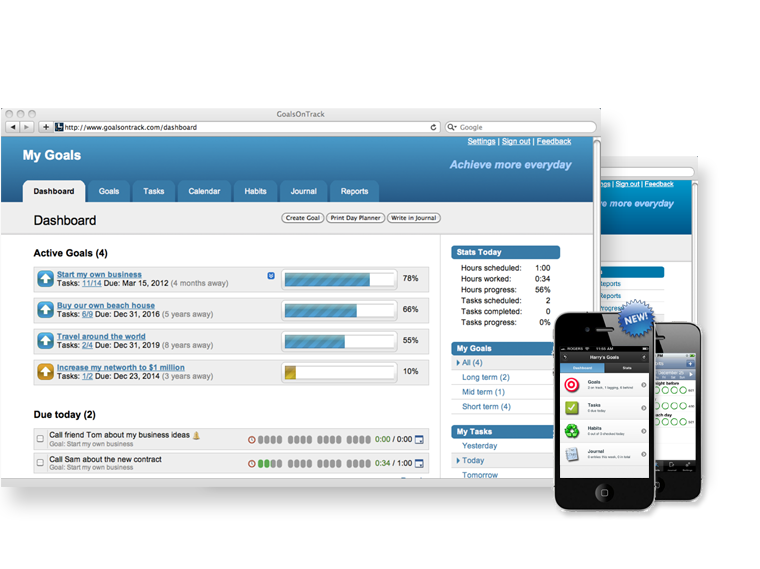New Year’s resolutions – so easy to make, so difficult to keep. Here are some powerful methods of making those New Year’s resolutions finally stick this year.
So you’ve made some New Years resolutions, and this year you plan to actually keep them past January 10. But what’s so different this year from all the other years? There will still be temptations. There will still be days when you lack the time. There will still be lapses of will power.
What will make this the year that you actually keep your New Year’s Resolution?
Here are a few clever strategies that you can use – starting right now – to give yourself an unfair advantage.
 Make a plan.
Make a plan.
For almost any major change, you need a plan. Sure, it’s easy to say, “I’ll just change.” But then life gets in the way, and without a plan to follow, the resolution quickly slips to the bottom of your priorities. The plan should answer these questions…
What steps will I take? You could just go cold turkey and throw out all your cigarettes or alcohol or sweets or whatever else might be your bane. But most people prefer to go gradual and need steps to keep from slipping backward.
Am I willing to make the effort? Effort means work. Effort does not mean “trying”. Effort means doing more than just trying. Effort means making it happen. No change is easy. No change is comfortable. Are you really ready to make that effort over a long period of time?
When will I do this? If the change is adding something positive, such as time with family or getting fit, you need to block off the time. Otherwise, you’ll get to the end of the day, week or month and find that it just did not get done.
How will I be reminded? One of the biggest challenges with keeping New Year’s resolutions is staying in focus. You need to decide the best way to keep this priority in front of your face. One option is with goal-tracking software (click on the image at the end of this post for a simple goal-tracking software you can start using today.)
What to do if I fail? There’s no shame in falling down. Shame is not getting backup again. Every day is a fresh start, but you need a plant to reboot. What’s you get-back-up-again plan?
Shout it out.
The more people you tell and the more often you tell them, the more likely you are to follow through. Why is this? For two reasons. First, the more people who know and the more recently they are reminded, the bigger your support team will be. Your friends will be there in greater numbers and more frequently cheering you on. But also, you will be more invested. You will work harder to follow through on your resolutions so as to save face.
Tell friends, family members. That is a good start. Those are the people most likely to help you, too.
Tell work colleagues. Once they know, you will feel much more compelled to follow through. Losing face at work is a much bigger deal than losing face in front of close friends.
Tell social media. Post your resolution to Facebook, Twitter and Google Plus. Once everybody knows, you have more invested. If you give regular updates, you will find some of your contacts to be very encouraging.
Start a blog. This is the power solution if you have a really BIG change you want to make. Now you not only are telling the world, but you are reporting to the world. Many personal growth blogs have been started by someone chronicling their own self-improvement journeys. Many personal finance blogs were born as part of someone’s determination to climb out of debt.
According to Enemy of Debt:
I founded EOD in April of 2008 in an effort to motivate and inspire financial discipline by focusing on behavior and truth…. My journey to debt freedom and financial independence began in January of 2008.
According to Debt Ninja:
“Maintaining a website about my financial priorities, habits, and opinions will benefit me 2, 5, and 10 years down the road as I will be reminded where I started and how far I’ve come.”
According to Girl Meets Debt:
“I also use to love shopping which is why I am writing this blog; to hopefully warn others not to make the same financial mistakes I foolishly did all through my 20s. Writing this blog will also keep me accountable and inspired to make smarter financial decisions as I enter my 30s.”
According to Yes, I Am Cheap:
I started this blog with well over $100,000 in debt after a failed business and some massive student loans. This is my journey of getting out of it without filing bankruptcy.
According to Blond on a Budget:
“After years of swiping for anything I dreamed of owning or doing, my bad spending habits had finally caught up with me and I was left with more than $28,000 of debt to pay off. To try and stay accountable throughout my debt repayment journey, I decided to start this blog.”
According to Debt Roundup:
I created this website because I took an all too familiar journey to get out of debt.
New Year's resolutions last longer when you have a solid plan. http://t.co/HQKhyenSMw
— David Leonhardt (@amabaie) January 10, 2014
Enlist help
Just telling people is not always enough. Enlisting their help is often a big advantage. Help can come in many ways.
Ask for reminders. Before you ask for a reminder, think about exactly how you want it phrased. Often well-meaning efforts can have the exact opposite effect. “Remind me to eat less,” can end up feeling more like a nagging stress than a helpful weight loss reminder. However, “Remember you asked me to remind you not to take second helpings?” is much more helpful. How can you be upset at someone for something they remind you that you specifically asked them to do?
Ask to remove temptations. Asking housemates to keep sweets out of the house (or locked away in their own drawers, rather than sitting out on the counter) can help you stick to a diet.
Ask for actual help. To get fit, you might want a training spotter. On diet, you might want someone to change the ingredients they cook with. To quit smoking, you might ask a smoker friend not to smoke in front of you. On spending more time with family, you might ask family members to commit certain days or times to spend with you.
Offer help.
You could trade support. I’ll support your efforts to quit smoking if you’ll support my efforts to get fit. Often just the act of supporting someone else can make you stronger in your own efforts. You feel more responsible and less susceptible to temptation.
Post a notice. You could post a notice at the office: “Got a New Year’s Resolution? So do I. Want to help support each other?” And see who responds.
Post a very specific notice. “Want to get fit? So do I. Want to help support each other?”
Join a support group. For such issues as weight loss, alcohol and drugs, fitness, smoking and such, there are support groups in most towns where the members help each other.
Pick just one.
There might be more than one thing you want to change. Don’t try doing them all at once. Pick one, focus on it like a Siberian tiger’s eyes zero in on an approaching rabbit, and make sure that the change is real and permanent before even thinking of making another change.
READ ALSO: The power of focusing your attention.
Remind yourself.
There are many ways you can remind yourself. Here are just a few…
- Sticky notes all over the house.
- Goal-tracking software, like the one below.
- Keep related magazines on the coffee table or in the bathroom.
- Start a blog – that is a great way to keep yourself reminded.
Easy-to-use goal setting software…

Got any other reminder ideas to add? That’s what the “comments” section below is for.
So what do you say? Will this be the year that you finally keep your new Year’s resolutions?




